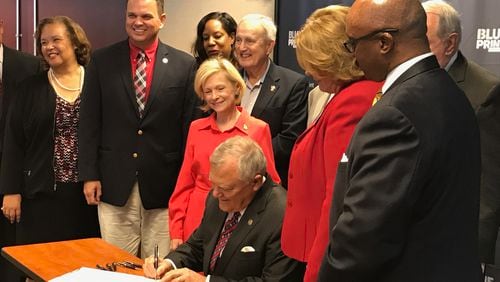Gov. Nathan Deal went to a social services office in Atlanta on Monday to sign next year’s state budget, highlighting the 19 percent raises it includes for child welfare workers and increases in payments to families who care for foster children.
The record $25 billion state budget, which takes effect July 1, includes 2 percent pay raises for 200,000 teachers and other state employees, along with more than $1 billion in borrowing for construction projects.
Bobby Cagle, the director of the Division of Family and Children Services, said the pay raise for his workers is badly needed because the agency has a 32 percent to 39 percent annual turnover rate, depending on the area of the state.
The starting salary will go up more than 19 percent, from $28,000 to $35,600 for those with bachelor’s degrees in social work.
“We will be able to pay staff a competitive salary,” Cagle said.
The budget includes $31 million to increase the daily rate the state pays foster parents and relatives caring for children.
While lawmakers have included extra money for teacher pay the past few years, they've allowed school districts the flexibility to decide how to spend the money. The Atlanta Journal-Constitution reported last fall that only 40 percent of districts gave out the money in this year's budget as salary increases.
So Deal and lawmakers stipulated that the money in the upcoming budget year go for pay raises, the first statewide cost-of-living raises in several years.
Some superintendents, however, are telling teachers they won’t necessarily get the full 2 percent.
Atlanta Public Schools Superintendent Meria Carstarphen said she will recommend a 1.5 percent pay raise. She said the system’s pay scale is higher than most, so the state’s contribution, along with local funding, would only pay for 1.5 percent. Some teachers and employees who already are paid above the maximum salary on their pay scale will receive one-time bonuses.
State officials say they are hearing similar reports from other districts.
State and University System of Georgia staffers would also be eligible for raises, although the amount will be determined by their department or school leaders.
The budget, which will hit $49 billion when federal and other funding are added, includes money for several major construction projects. The state will borrow $100 million for bridge repair, replacement and renovation projects, and $55 million for improvements at the Georgia World Congress Center in Atlanta.
It includes money for two expensive projects supported by Deal: $105 million for construction of a new building that will house the state's Supreme Court and Court of Appeals on the site of the former archives building in Atlanta, which was imploded in March, and $73 million more to complete a new technical college campus in the governor's home county of Hall.
Deal had added $10 million to the budget in 2015 to buy the land for the technical college and $48.3 million last year to get the construction started. Including next year's budget, the state will have borrowed more than $130 million to move Lanier Technical College from one end of the county to the other and create a new campus.
Under the spending plan, doctors and dentists will receive an increase in payments for treating Medicaid patients. Nursing homes will get more to care for the elderly.
Deal said the upcoming year’s state budget is based on a 3.5 percent growth in tax revenue. Most of the state’s money comes from income and sales tax collections. State revenue collections are up 3.5 percent this fiscal year, which ends June 30.
“We are confident the economy of this state is going to continue to grow,” Deal said. “This is a great budget. It encompasses many areas of need. It reflects a growing population of this state and reflects the growing economy of this state.”
Construction projects
The new state budget that takes effect July 1 borrows about $1 billion for construction and equipment. Below are some of the borrowing projects in metro Atlanta:
- $105 million for a new complex in Atlanta that will house the state's Supreme Court and Court of Appeals
- $73 million to complete construction and equip the new Lanier Technical College campus in Gainesville
- $55 million to plan, construct and equip a new exhibition facility at the Georgia World Congress Center
- $47 million for construction and for equipment for renovations of Price Gilbert Library and the Crosland Tower complex at Georgia Tech
- $11.7 million to build and equip a Juvenile Transition Center in Gwinnett County
- $11.5 million for an addition to the academic building at Georgia Gwinnett College
- $9.9 million to renovate Metro State Prison in Atlanta as a re-entry and transition prison
- $6.9 million to fund construction and renovations at Clayton State University
- $5 million to fund a science lab addition at Kennesaw State University's Marietta campus
- $5 million to fund Kell Hall's demolition and infrastructure on Georgia State University's campus
- $3.88 million to buy equipment for the new Industrial Training and Technology Building at Southern Crescent Technical College in McDonough
- $2 million to expand an Xpress Bus Park in Lawrenceville
- $1 million to replace the HVAC system at the Atlanta Area School for the Deaf in Clarkston
- $600,000 to buy equipment for Georgia State University's Alpharetta Labs and Learning Center
About the Author








